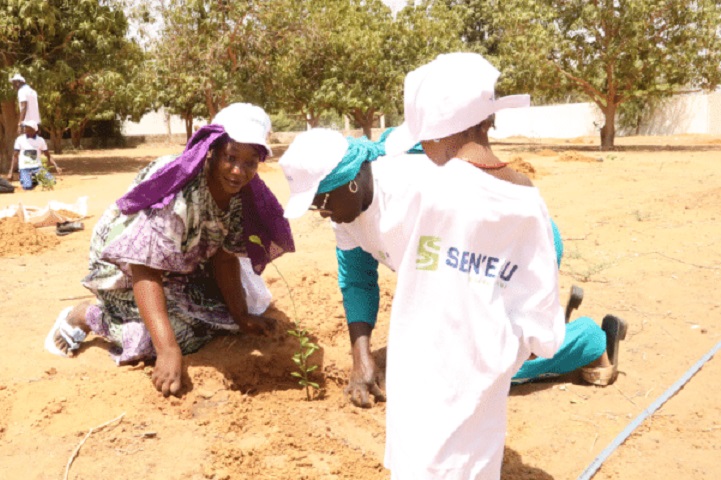11 Dec 2024

Tired Earth
By The Editorial Board

The company, which provides the public drinking water service in Senegal's urban and suburban areas, will soon be installing solar power plants to operate its largest facilities. At the same time, it is investing in a more sustainable alternative for water treatment, but also for biodiversity.
How can we ensure the sustainable production of drinking water in Senegal? SEN’EAU, the company that produces and distributes drinking water in urban and peri-urban areas of Senegal, is making strategic investments, starting with improving the water treatment process. To achieve this, chlorine is being replaced by electrochlorination at the plants.
This technique offers invaluable security of supply for water services, by generating a sodium hypochlorite solution on site, on demand, for water disinfection. The sodium hypochlorite solution is produced by electrolysis of salt, a resource available in Senegal. It is a natural alternative, given that ‘the use of chlorine gas represents a high risk, particularly for residential areas near storage sites. We’re also having problems transporting this chlorine with large international carriers’, explains Magatte Niang, Managing Director of SEN’EAU.
Boosting energy efficiency with solar power
The utility is implementing the electrochlorination technique at the Point B plant in the capital Dakar, ‘and we plan to deploy this process in the largest drinking water infrastructures, starting with the Keur Momar Sarr (KMS) plants, which have a combined capacity of 300,000 m3 per day’, says Magatte Niang, who plans to liaise with his partner, Senegalese National Water Company (SONES), to use electrochlorination throughout Senegal.
At the same time, SEN’EAU wants to improve the energy efficiency of its drinking water installations. As part of this eco-responsible approach, the company has signed a partnership with TotalEnergies for two solar farms. The larger solar farm will be located at the Keur Momar Sarr site in the Louga region. With a capacity of 11.2 MWp (megawatt peak), the plant will be equipped with 20,600 solar panels and will supply up to 32% of the electricity needed to run the drinking water plants.
Reducing electricity bills
In the Thiès region, the second solar power plant (9.3 MWp) will be built to cover 32% of the electricity needs of the Mékhé booster station. This flow accelerator will enable larger volumes of water (200,000 m3 per day) to be transported to the major consumer areas of Dakar, Thiès, the Petite-Côte and the new urban centres, from the third drinking water plant at Keur Momar Sarr. The two photovoltaic solar farms, on which work will start by the end of 2024, will have a combined capacity of 20 MWp.
Thanks to these clean energy plants, SEN’EAU will be able to ‘save between 800 million and 1 billion CFA francs (between 1.2 and 1.5 million euros). At the same time, we are thinking about equipping our branches with rooftop solar systems. Solar resources are very abundant in Senegal and equipment is becoming increasingly affordable’, says Magatte Niang.
Greening water infrastructures
Under the impetus of its Managing Director, SEN’EAU is also making biodiversity a key priority by planting trees around its drinking water plants.

To mark World Environment Day on 25 June 2024, SEN’EAU launched the ‘One Jambar (water warrior in Wolof), one tree’ challenge. ‘The aim is to raise our employees’ awareness of the behaviour they should adopt with regard to the environment. The idea is for this exemplary behaviour to be passed on to their families, and eventually within their communities’, explains Magatte Niang.
Reducing over-consumption of paper
The operation has already begun at the KMS site, with a batch of 150 trees planted. This initiative will make it possible to plant 1,000 trees of 43 rare or endangered species at the company’s sites. One of the ways in which SEN’EAU is looking to reduce its environmental impact is by cutting down on the use of paper in its offices. ‘It sounds simple enough, but this strategy must go hand in hand with digitisation,’ says SEN’EAU’s Managing Director.
This initiative is part of a global drive to cushion the economic impact of over-consumption of paper. It is estimated that a company with around a hundred employees spends between €10,000 and €25,000 each year just on its internal paper consumption and equipment maintenance. What’s more, the paper industry is estimated to contribute to nearly 600 million tonnes of carbon dioxide (CO2) emissions every year, according to the World Wildlife Fund (WWF).
Source : afrik21.africa
Comment